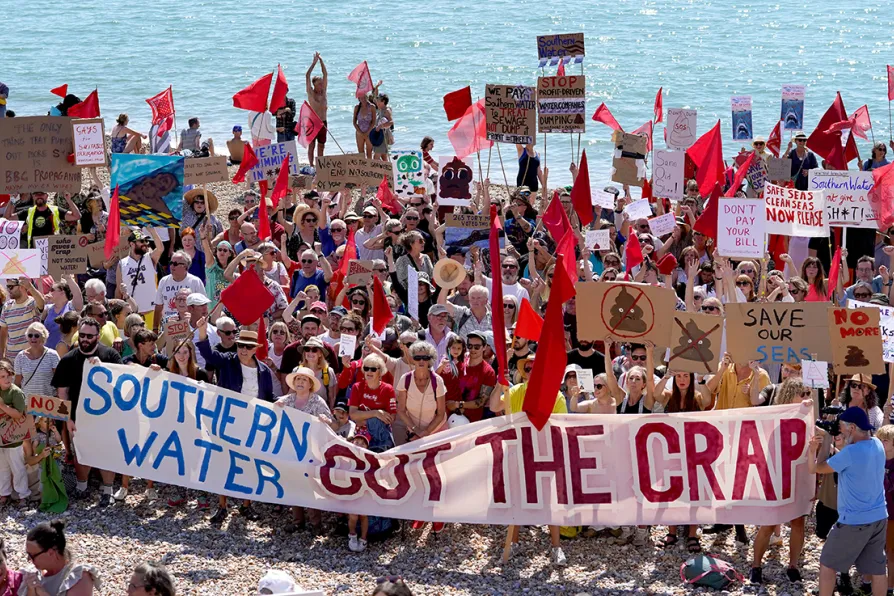
 Members of the public and protesters from Hastings and St Leonards Clean Water Action, protest against raw sewage release incidents on the beach in St Leonards, Sussex, August 26, 2022
Members of the public and protesters from Hastings and St Leonards Clean Water Action, protest against raw sewage release incidents on the beach in St Leonards, Sussex, August 26, 2022
A LAME offer to cut sewage “spills” (a generous term for the deliberate discharge of untreated sewage into Britain’s waterways a staggering 825 times a day last year) by a third over the next seven years.
That’s what the water sector has come out with nearly a year after the Environment Agency called for executives to serve jail time for the outrageous and vast-scale pollution of our rivers and seas.
Water UK chair Ruth Kelly — once a minister in the Blair and Brown cabinets, who happily voted for an illegal war against Iraq and the introduction of university tuition fees, but whose conscience forced her to quit a Labour Party led by Jeremy Corbyn — channels the folksy New Labour-speak of those days when assuring the public that water companies “get it,” apologising for the “upset and anger” caused by the spills and expressing the sector’s readiness to invest £10 billion in infrastructure (and raise our bills to pay for it).
This is frankly an insult from an industry that has paid out more than £70bn in dividends since privatisation.
One whose CEOs not only do not go to jail for ruining our environment, but who award themselves massive bonuses even while paying fines for breaking the law.
The pattern is the same across the industry: Thames Water was fined £4 million in 2021 for sewage discharges, but chief executive Sarah Bentley got £2m in pay and bonuses. Severn Trent boss Liv Garfield got £3.9m in the same year; the firm also paid out millions in fines for pollution, such as £1.5m for sewage-dumping in Worcestershire. Southern Water’s (now retired) Ian McCaulay pocketed a £550,000 bonus in the year it paid a record £90m fine for dumping on a scale that showed “shocking and wholesale disregard for the environment.”
Though ordinary workers have been subjected to the longest wages squeeze in centuries since 2008 and are continuing to suffer real-terms pay cuts in most sectors, those at the top still want more.
“City grandees call for higher pay to lure and retain executives,” the Financial Times surprised nobody by reporting this month.
Britain’s biggest asset manager Schroder’s CEO Peter Harrison intoned the old plutocrat prayers. “Boards need the freedom to attract the best CEOs to run British companies for the best long-term outcomes,” he urged.
Yet the state of the water supply suggests precisely the opposite. Chief executives on absurd remuneration packages show no interest whatever in the “best long-term outcomes” — only in short-term profit, which incentivises the most destructive behaviour.
The firms threatening to raise our bills again to clean up their mess have run down the vital infrastructure they were trusted with through privatisation. And they have already raised bills by 40 per cent above inflation in that time simply to enrich themselves.
Six years ago — when a left-led Labour Party was riding high following its 2017 election advance — former prime minister Gordon Brown admitted that the failure to jail bankers after the financial crash was one reason big finance had learnt no lessons.
Yet today’s Labour is not echoing Environment Agency calls for water bosses to be jailed.
Worse, it is not even proposing to take the sector back into public hands any more. Shadow chancellor Rachel Reeves says nationalisation is too expensive — as if the whole country were not paying through the nose for the current privatised system, and paying with our futures too, as waterways are poisoned and ecosystems wrecked.
Perhaps Ruth Kelly’s re-emergence as a spokeswoman for the corporate water industry suggests the Labour front bench’s real motive to keep the gravy train rolling — the revolving door with big business that assures ministers who do it the right favours are in line for lucrative rewards down the track.













